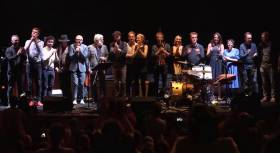Displaying items by tag: 1916 Easter Rising
On RTE One Tonight: New Documentary 'Starboard Home'
A new documentary 'Starboard Home' (on RTE One tonight at 10.15pm) which formed part of the 1916 Easter Rising centenary commemorations held in Dublin, involved musicians commissioned to produce works inspired by the capital, its port and the Liffey.
In a rare musicial opportunity, Dublin Port and the National Concert Hall invited Irish musicians to respond to the theme resulting to an acclaimed modern song cycle that rekindles the formative bond between the city and Dublin Bay through music, song and the spoken word.
Among musicians lined up for the unique commemorative event were James Vincent McMarrow and Gemma Hayes.
In conjunction with tonight's broadcast, Moira Sweeney’s film ‘Keepers of the Port’ will be airing on RTÉ’s Culture website.
So keep a look-out! for the Starboard Home documentary which is one not to be missed!
1916 Easter Rising Maritime Themed Exhibition: Portals of Unpreparedness
#1916rising – A 1916 Easter Rising maritime themed exhibition entitled ‘Portals of Unpreparedness’ was launched today (14 November) in the Dun Laoghaire Lexicon Library.
The exhibition focuses on the arrival on the morning of 26th April 1916 of the Sherwood Foresters Regiment of the British Army in Dún Laoghaire (Kingstown in 1916). From there the regiment would march to Dublin and the Battle of Mount Street Bridge.
The exhibition by Leo Cullen and Peter Derbyshire is held on Level 5 of the Lexicon and continues to 20th December.
The main bulk of the British Army force, the non-commissioned ranks, made the Irish Sea crossing on board S.S. Tynwald and the officers on S.S. Patriotic. Also involved was the S.S. Munster as previously reported on Afloat.ie following the RTE/BBC documentary ‘The Enemy Files’ presented by former British Conservative Defence Minister Michael Portillo.
The portals, or viewpoints onto the events, as seen by a variety of witnesses include: the porthole of a troop carrier on the Bay; a window of the Royal St. George’s Yacht Club and the top of a tram.
The exhibition deploys hand drawn map images sourced from contemporary maps, paintings and sketches and commentary through poetry and prose.





























































